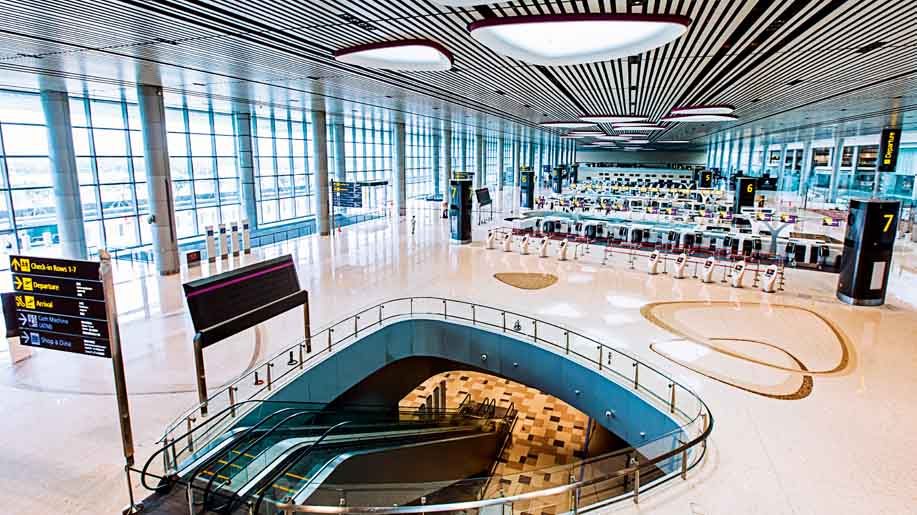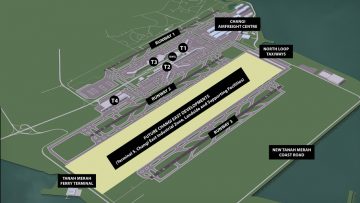
The coronavirus, which originated in the Chinese city of Wuhan, has now crossed borders with cases confirmed in several regions outside of mainland China, including Singapore, Hong Kong, South Korea, Thailand and Japan. In Singapore alone, there are over 90 cases according to South China Morning Post.
Airports such as Singapore’s Changi Airport, one of the busiest airports in the world, have begun to take precautionary steps to curb the spread of the virus. From carrying out more temperature screenings, to switching out regular cleaning solutions for disinfectants, the airport said it has stepped up measures to safeguard and protect workers, passengers and visitors travelling through the major transportation hub against the coronavirus (Covid-19).
More hand sanitisers at terminals
The airport said the number of hand sanitisers in the terminals and Jewel, a mixed-use complex that opened in April last year, has increased from about 160 to more than 1,200. It added that a few hundred of these sanitisers operate using a motion sensor, reducing the need for users to touch them.
These hand sanitisers can be found at check-in rows, departure and arrival immigration areas, staff entrances, retail and dining outlets, gate hold rooms and “many other high-traffic locations”.
At Jewel, they are available at the concierge counters and at the entrances and exits of all the Canopy Park attractions.
Frequent cleaning of “high contact areas”
Changi Airport said it has “at least doubled” the frequency of all its cleaning efforts in the four terminals and at Jewel. It is now using disinfectants, a chemical liquid that destroys bacteria, instead of “general purpose cleaning solutions”.
Frequently used areas such as door knobs and handles, touch-screens, handrails (e.g. on moving walkways and escalators), counter tops, railings at taxi and bus queues, lift buttons, water coolers and play areas. These areas, the airport said, are cleaned and disinfected more frequently, up to four times a day. Tables at food and beverage outlets are cleaned and disinfected each time they are cleared.
In the airport terminals and at Jewel, toilets are cleaned and litter bins are emptied out more frequently, said the airport. Disinfectant is used for toilet flush buttons, door knobs, grab bars, toilet paper dispensers and seat sanitiser dispensers.
All cleaning staff are equipped with disposable gloves and masks to carry out cleaning and disinfection works, the airport added.
As an added layer of protection in between cleaning rounds, Changi Airport said it has started to coat frequently-touched surfaces with a protective disinfectant coating known as quaternary ammonium chloride.
This coating is applied to automated check-in kiosks and automated bag-drop machines, GST refund kiosks, immigration counters, lift buttons, escalator handrails, and information counters. The attractions at Jewel’s Canopy Park, such as the discovery slides, have also been similarly coated.
“With a single application sprayed onto surfaces, the compound used reduces the chance of viruses and bacteria staying on them,” said the airport.
Temperature screening
Airport staff, passengers and visitors entering the transit areas of the airport need to undergo temperature screening.
Temperature screening is also carried out for guests entering Jewel’s Canopy Park, Changi Experience Studio, Changi Lounge, Shaw Theatres, and Yotelair Changi Airport.
Cleaning with “ozone-infused water”
“For the first time, ozone-infused water is being used to disinfect toilet floors, toilet bowls and urinals in high-usage toilets,” said the airport.
According to Changi, ozone-infused water is a stronger cleaning agent and disinfectant compared to chlorine, a commonly used disinfectant.
Disinfecting floors and cleaning carpets
The airport said automation is used to clean the floors.
“A total of 26 automated machines make their rounds scrubbing the hard floors while another two sweep the carpets daily,” said the airport.












